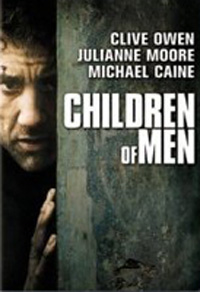 One of the many surprising things about Alfonso Cuarón’s adaptation of PD James’s novel The Children on Men is the transformation of a dry and highly conservative novel into an exciting and, at least on the surface, quite radical movie.
One of the many surprising things about Alfonso Cuarón’s adaptation of PD James’s novel The Children on Men is the transformation of a dry and highly conservative novel into an exciting and, at least on the surface, quite radical movie.
This adaptation, the definite-article-deprived Children of Men, bears only a passing relationship with the novel. James looked into the maw of Armageddon and emerged concerned only with the emotional constipation of the WASP bourgeoisie, the plodding architecture of the Anglican Church and naive religious allegory. Writing in 1993, James’s “future” England actually harks back to an imagined, idyllic 1950s, whereas Cuarón’s film could hardly be more contemporary. The two share a premise – what would happen to the world if humanity became infertile – and some character names, but develop in quite a different direction.
In both stories Theo (Owen) lives in a world where no woman has conceived for decades and where England is ruled by an authoritarian government who have preserved a kind of order as the rest of the world succumbs to chaos. Theo becomes involved with a group of opponents of the regime, the Fishes, and through them discovers that a young woman is, miraculously, pregnant. He becomes committed to protecting the woman and her child from the forces of chaos around her as people struggle to exploit the baby for political ends.
The most impressive of Cuarón’s departures from James’s story is in his ision of this future England. Gone are the novel’s depopulated but still genteel country villages and the wistful decay of donnish Oxford, to be replaced by a cramped, dirty and violent metropolitan anarchy. The cinematography and set design are superb. Dystopian London is realised in fantastic detail and is both immediately recognisable and fundamentally alien. It all combines to give the film a powerful visual impact.
But it is in the politics of the story where James and Cuarón diverge most crucially. Cuarón’s story is set in a world where the impositions on personal freedom undertaken in pursuit of the “War on Terror” have been extended to their most extreme conclusion. All foreigners are herded into cages like cattle, the freedom to travel has been restricted and law is enforced with unbridled brutality. Meanwhile the country is full of frustrated, disenfranchised and angry masses ready to burst into violence.
James hints at such abuses, but they are distant and never directly impinge on the still comfortable lives of her characters. Even her terrorists ultimately concede that they wouldn’t really do anything very different from the government, even if they could. For Cuarón, by contrast, the reality of chaos and oppression is right at the heart of the story and gets presented in eye-blistering detail. One scene, as Theo and Kee (Ashitey) enter Bexhill –a vast internment camp where refugees live in squalor – is like a “best of” collection of recent news images, replaying scenes from Guantanamo Bay and Abu Ghraib.
Cuarón’s anger at such abuses of justice is obvious and it is clear that the film’s sympathies are with those suffering abuses – the poor, the immigrants, the weak – but if I have a reservation about Children of Men it is that, while it is clear what Cuarón is against, it’s far from obvious what he is for. The film is awash with moral ambiguity – the government is corrupt, but so are those leading the fight against it. Even Theo is damaged – a drunkard, former activist who now works for the government and who is dragged into Kee’s life by the pledge of cash.
Only Jasper (Caine) seems to have Cuarón’s undivided admiration – but Jasper has withdrawn from the world, living in isolation in the woods, smoking dope and dispensing stoner wisdom. Jasper has paid a price for his past resistance to the government but, immensely likeable though he is (Caine is excellent), his disengagement from the world hardly offers a solution to the problems of this future.
The only other moment where Cuarón seems to reveal an alternative vision comes in the midst of a battle sequence that pounds the senses like a bad day in Beirut. Soldiers, rebels and refugees are halted in their tracks by a crying baby as Theo and Kee pass through them all in a moment of perfect stillness. It is an undeniably powerful image – a common thread of humanity amidst carnage – but it is also one of very few moments in the film that don’t ring true. Everyone stands back to reverentially let them pass, nobody questions this extraordinary sight, no one tries to grab the child for themselves, and none of the soldiers think of stopping them.
There is undoubted power in Cuarón’s furious “if this goes on” critique of the present, but his film is much less convincing when positing alternatives.
Despite this slight reservation, Children of Men is a tremendously successful piece of entertainment – I found myself completely involved in the story and wrapped up in the world Cuarón creates. Strong performances from Caine and the trio of women (Moore, Ferris and especially Ashitey) plus a great cameo by Mullan as a corrupt immigration officer bring the story to life. And, as Theo warms up during the course of the story, Owen delivers an excellent, vulnerable performance as a leading man.
This is intelligently made cinema, combining handsome good looks with a genuine desire to talk about important and pressing issue and that makes it perhaps the first truly unmissable sf movie of 2006.